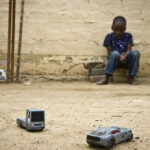The joy of motherhood is killed by a moral and ethical dilemma when doctors advise termination of a pregnancy.
Dora Mkize* (20) screamed for joy when she found out she was pregnant. Although unplanned, she was excited to become a mother and her delight escalated when doctors at the KwaZulu-Natal hospital told her she was having twins. But Mkize’s joy turned to horror when she found out that one of her babies was not developing properly. Her doctors advised her to terminate the fetus — through a caesarean section operation — because there was no hope for its survival and it could also endanger the healthy baby.
Mkize, already almost eight months pregnant, could not face aborting her baby. Anaemia was the cause of the second baby’s irregular development. Mkize could not provide enough nutrients, mostly iron, for both babies to develop properly.
Her doctors told her that, if she had been diagnosed earlier, simple daily supplements of folic acid could have prevented this scenario. But she only found out that she was pregnant at six months.
- Read this for a list of five things to avoid when pregnant
Unplanned pregnancy
Almost half of all pregnancies globally are unplanned, according to a 2014 study conducted by United States-based research organisation Guttmacher Institute. Published in the academic journal Studies in Family Planning, the research found that 40% of the 85-million pregnancies in 2012 were unintended.
Half of these pregnancies were aborted, 38% resulted in live births and 13% ended in miscarriage. Africa had comparably lower rates of unplanned pregnancies at 35%, but the authors said more abortions occurred in African countries than in developed countries. And many of these abortions are unsafe because they are illegal or frowned upon.
“Each year in the developing world, thousands of women die and many more are seriously injured as a result of unsafe clandestine abortions,” the authors said.
Many women face “deep trauma” as a result of unplanned pregnancies for many reasons, said Sylvester Chima, a medical ethics expert from the University of KwaZulu-Natal.
“Not planning for a family often results in serious health consequences, not always the fault of the mother but almost always she will be the one to suffer,” he says.
Fetal alcohol spectrum disorder
Many women unknowingly take unsafe medication, drink alcohol or smoke tobacco, which could harm their fetus. Recent research has shown that the highest reported rates of fetal alcohol spectrum disorder (FASD) are in Africa.
The US Centers for Disease Control and Prevention described FASD is a “group of conditions that can occur in a person whose mother drank alcohol during pregnancy” resulting in mild to severe consequences such as stunted growth, intellectual disabilities, abnormal facial features, vision and hearing issues as well as problems with the heart, kidneys or bones.
One in 10 grade one children has FASD in parts of the Eastern Cape, a Foundation for Alcohol Related Research study found. Although many of the women in this study continued to drink once they knew they were pregnant, others did not. Chima says the emotional consequences for a woman can be devastating.
“A woman can experience debilitating guilt and then face another ethical dilemma: to choose to terminate, if that is a legal option in her country.”
He says 11 African countries have criminalised abortion and many others restrict the procedure to special cases such as pregnancy by rape or incest, and as a result of abnormalities in the fetus.
- Read about planning pregnancies using the best forms of contraception
Safe or unsafe abortions?
“Many women then face the added burden of whether to choose unsafe abortion services or risk her life or have the unwanted pregnancy despite the consequences.”
Women on the continent, especially those in rural areas, could be further disadvantaged by weak health systems that do not have the medical equipment needed to identify fetal abnormalities.
An example of this was the recent outbreak of the Zika virus in South America, which placed many women in the situation of “having to decide to terminate even if it is against one’s religious beliefs or not having the choice at all and giving birth to a baby who will die in a matter of weeks,” Chima says.

The virus is transmitted by mosquitoes, causing mild fever-like symptoms, and pregnant women who are infected risk giving birth to children with microcephaly — underdeveloped brains — according to the World Health Organisation.
“These parts of the brain oversee bodily functions that don’t require active thought. Affected children will need constant care for the remainder of their lives. Health professionals are unable to confirm the life expectancy of a baby with microcephaly who is severely intellectually impaired, and the prognosis is not a good one,” says Chima.
But even with access to safe abortion and sophisticated medical attention, Chima says women face an ethic and moral dilemma.
“With a duty to protect women’s autonomy and preservation of scarce healthcare resources on the one hand, but the fetuses’ right to personhood and the doctor’s moral obligation to society on the other, counselling women to make an informed decision is a real challenge,” he says.
Mkize found the medically advised choice too difficult to make. “I trusted in God to make the decision for me,” she says. “I can’t decide to end this baby’s life — I shouldn’t have to.”
Her healthy baby survived when she gave birth at nine months by caesarean section. But she spent two weeks in hospital watching her second child through the glass of an incubator.
“I knew I had my daughter at home but that she did not replace my other child,” she says.
The young mother struggled to breastfeed her healthy child because she was spending so much time at hospital, but she found it almost impossible to leave. The baby died after nine weeks at the hospital. “It was the worst thing I have experienced in my life,” she says.
“Watching my baby die.”
* Not her real name
Amy Green was a health reporter at Bhekisisa from 2013 until 2016.





